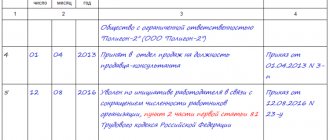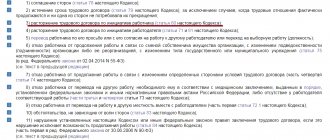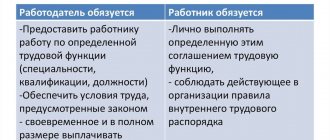As a general rule, labor relations arise between an employee and an employer on the basis of an employment contract concluded by them in accordance with the rules established by the Labor Code. But in addition to this method, labor legislation provides for other grounds for the emergence of such relations. We will tell you what these reasons are in this article.
In accordance with Art. 15 of the Labor Code of the Russian Federation, labor relations are understood as relations based on an agreement between the employer and the employee on the latter’s personal performance for payment of a labor function (work according to the position in accordance with the staffing table, profession, specialty indicating qualifications; the specific type of work entrusted to the employee), subordination of the employee rules of internal labor regulations when the employer provides working conditions provided for by labor legislation and other regulatory legal acts containing labor law norms, collective agreements, agreements, local regulations, employment contracts.
The parties to the labor relationship are the employee (an individual who has entered into an employment relationship with the employer) and the employer (an individual or legal entity (organization) that has entered into an employment relationship with the employee. In cases provided for by federal laws, another entity may act as an employer, entitled to enter into employment contracts).
Labor relations always arise on the basis of an employment contract, which can be concluded on the basis of various circumstances. Most often, an employment contract is concluded by agreement of the parties. However, it can also be concluded as a result (Article 16 of the Labor Code of the Russian Federation):
- election to office;
— appointment to a position or confirmation in a position;
— election by competition to fill the relevant position;
- assignments to work by bodies authorized in accordance with federal law against the established quota;
— a court decision on concluding an employment contract;
- actual admission of an employee to work with the knowledge or on behalf of the employer or his representative in the case where the employment contract was not properly drawn up.
Let us recall that an employment contract is an agreement between an employer and an employee, according to which the employer undertakes to provide the employee with work for a specified labor function, to provide working conditions provided for by labor legislation and other regulatory legal acts containing labor law norms, a collective agreement, agreements, local regulations and this agreement, pay the employee wages in a timely manner and in full, and the employee undertakes to personally perform the labor function defined by this agreement, to comply with the internal labor regulations in force for this employer (Article 56 of the Labor Code of the Russian Federation).
Let us consider in more detail the above-mentioned reasons for concluding an employment contract, and consequently, the emergence of labor relations.
Labor relations as a result of election to office
Labor relations on the basis of an employment contract as a result of election to a position arise if election to a position requires the employee to perform a certain labor function (Article 17 of the Labor Code of the Russian Federation). Therefore, election to a position can become the basis for the emergence of labor relations both in institutions financed from budgets of various levels, and in commercial enterprises.
Note.
Labor function - work according to the position in accordance with the staffing table, profession, specialty indicating qualifications;
the specific type of work entrusted to the employee (Article 57 of the Labor Code of the Russian Federation). Election to a position does not always entail the conclusion of an employment contract. For example, labor relations do not arise in the case of citizens being elected as deputies of the State Duma of the Federal Assembly of the Russian Federation, since a citizen, being elected as a representative of the population of the country, performs duties in a deputy position not in the interests and not under the direction of any employer (which in this case no), but in the interests of the whole society.
Since Art. itself 17 does not establish a list of positions with a specific labor function for which an election procedure is necessary; one should refer to laws or other regulations defining the elective procedure for filling certain positions. Let us name some laws that define this basis for entering into labor relations for managers of legal entities of various forms of ownership, since the performance of labor duties involves the exercise of the functions of the sole executive body of a legal entity.
1. Federal Law of December 26, 1995 N 208-FZ “On Joint-Stock Companies” - the sole executive body of a joint-stock company is usually elected at a general meeting of shareholders, and in cases provided for by the charter, the resolution of this issue may be included in the competence of the board of directors or the supervisory board of the company.
2. Federal Law of 02/08/1998 N 14-FZ “On Limited Liability Companies” - the director is elected by the general meeting of the company’s participants (Article 40).
3. Federal Law of July 19, 1998 N 115-FZ “On the peculiarities of the legal status of joint-stock companies of employees (national enterprises)” - the head of the enterprise is elected by the general meeting of shareholders of the company.
4. Federal Law of 05/08/1996 N 41-FZ “On Production Cooperatives” - the chairman of the board of the cooperative is elected by the general meeting of members of the cooperative.
5. Federal Law of August 22, 1996 N 125-FZ “On Higher and Postgraduate Professional Education” - rectors of a state or municipal higher educational institution are elected in the manner established by the charter of such a higher educational institution.
Let us note that the emergence of labor relations as a result of election to a position may be provided for not only by laws, but also by the charters or local regulations of the employer, since labor legislation does not contain any restrictions on the categories of employees in respect of whom such a procedure for the emergence of labor relations may be applied. .
Concept of labor relations
What is labor relations?
Based on the provisions of Article 15 of the Labor Code of the Russian Federation, labor relations are any relationship that results in the employee performing certain actions for an appropriate remuneration. A special feature of labor relations is the employment contract.
Example: the Zelenstroy enterprise (headed by N.I. Potapova) employed 2 employees as janitors. The company refused official employment, which did not cause any complaints from employees.
The absence of an employment contract did not become a reason for refusal to perform the requested work, and therefore, a reason for interrupting the existing labor relationship. The parties entered into an oral agreement, confirmed by facts and actions; this is quite enough to recognize them as legal.
Election by competition
Article 18 of the Labor Code of the Russian Federation establishes that labor relations on the basis of an employment contract as a result of election through a competition to fill the corresponding position arise if labor legislation and other regulatory legal acts containing labor law norms, or the charter (regulations) of the organization determine the list of positions to be filled by competition, and the procedure for competitive election to these positions.
The cases and procedure for the emergence of labor relations on the basis of an employment contract as a result of election to a position through competition may be established by law or other regulatory legal acts. However, there are cases when holding a competition necessarily precedes the conclusion of an employment contract.
So, in accordance with the requirements of Art. 332 of the Labor Code of the Russian Federation, the conclusion of an employment contract to fill the position of a scientific and pedagogical worker in a higher educational institution, as well as transfer to such a position, is preceded by election through a competition to fill the corresponding position. If an open-ended employment contract has been concluded with a scientific and pedagogical worker, the competition must still be held at least once every five years.
In addition, the competition should be held to fill positions of scientific workers and heads of scientific institutions and scientific workers of scientific centers subordinate to the Russian Academy of Sciences. The regulations on holding a competition to fill these positions were approved by Order of the Ministry of Education and Science of the Russian Federation, the Ministry of Health and Social Development of the Russian Federation and the Russian Academy of Sciences dated May 23, 2007 N 145/353/34.
Research and teaching staff also enter into employment contracts based on the results of a competition, the regulations for which are approved by Order of the Ministry of Education of the Russian Federation dated November 26, 2002 N 4114.
For employees of certain categories, the procedure for holding a competition to fill a vacant position is established by decrees of the Government of the Russian Federation or decrees of the President of the Russian Federation. These are the heads of federal state unitary enterprises and state civil servants.
Changing the terms of cooperation
Adjustments to working conditions can be implemented at the initiative of both the employee and the employer. Changes may be due to transfer to another position. This action is implemented:
- when production needs arise;
- in case of downtime due to the fault of the employer;
- under the influence of uncontrollable external factors.
A transfer on contractual terms is possible, while the list of probable grounds for dismissing an employee at the initiative of the employer remains the same and is regulated by the Labor Code of the Russian Federation.
Changing the terms of cooperation at the request of the employee without the mandatory consent of the employer is possible if we are talking about a pregnant employee who, according to medical regulations, needs to create special working conditions.
Employees who have children under the age of 1.5 years have a guaranteed right to change the provisions of the employment contract. The employer is obliged to accommodate this category of officials if it is not possible to perform labor functions to the same extent or under normal conditions.
Appointment or confirmation to a position
Labor relations arise on the basis of an employment contract as a result of appointment to a position or confirmation in a position in cases provided for by labor legislation and other regulatory legal acts containing labor law norms, or the charter (regulations) of the organization (Article 19 of the Labor Code of the Russian Federation).
In practice, workers are mainly appointed to positions in government bodies, for example, in the prosecutor's office or state-owned enterprises. In accordance with Art. 128 of the Constitution of the Russian Federation, judges of the Constitutional Court, the Supreme Court, and the Supreme Arbitration Court are appointed by the Federation Council on the proposal of the President of the Russian Federation, and judges of other federal courts are appointed by the President of the Russian Federation in the manner established by federal law.
But the act of appointment is required not only in government agencies. For example, according to Art. 55 of the Civil Code of the Russian Federation, heads of representative offices and branches are appointed by a legal entity and act on the basis of its power of attorney. Procedures for appointment to a position are determined by the constituent documents and other local regulations.
Basic rights and obligations of an employer
The employer has the right:
- conclude, amend and terminate employment contracts with employees in the manner and on the terms established by the Labor Code of the Russian Federation;
- conduct collective negotiations and conclude collective agreements;
- encourage employees for conscientious, effective work;
- require employees to fulfill their job duties and take care of the property of the employer and other employees, and comply with the internal labor regulations of the organization;
- bring employees to disciplinary and financial liability in the manner established by the Labor Code of the Russian Federation;
- adopt local regulations;
- create associations of employers for the purpose of representing and protecting their interests and join them.
The employer is obliged:
- comply with laws and other regulatory legal acts, local regulations, terms of the collective agreement, agreements and employment contracts;
- provide employees with work stipulated by the employment contract;
- ensure labor safety and conditions that meet occupational safety and health requirements;
- provide workers with equipment, tools, technical documentation' and other means necessary to perform their job duties;
- provide workers with equal pay for work of equal value;
- pay in full the wages due to employees within the terms established by the Labor Code of the Russian Federation, the collective agreement, the internal labor regulations of the organization, and employment contracts;
- conduct collective negotiations and conclude a collective agreement;
- provide employee representatives with complete and reliable information necessary for concluding a collective agreement, agreement and monitoring their implementation;
- promptly comply with the instructions of the federal executive authorities authorized to carry out state control and supervision, pay fines imposed for violations of laws and other regulatory legal acts containing labor law standards;
- consider submissions from trade union bodies and other representatives elected by employees about identified violations of laws and other regulatory legal acts containing labor law norms, take measures to eliminate them and report on the measures taken to these bodies and representatives;
- create conditions that ensure the participation of employees in the management of the organization;
- provide for the everyday needs of employees related to the performance of their job duties;
- implement compulsory social insurance for employees;
- compensate for harm caused to employees in connection with the performance of their job duties, as well as compensate for moral damage.
Actual permission of the employee to perform work
According to Art. 61 of the Labor Code of the Russian Federation, an employment contract comes into force from the day it is signed by the employee and the employer, unless otherwise established by federal laws, other regulatory legal acts of the Russian Federation or the employment contract, or from the day the employee is actually admitted to work with the knowledge or on behalf of the employer or his representative.
Paragraph 12 of the Resolution of the Plenum of the Armed Forces of the Russian Federation dated March 17, 2004 N 2 “On the application by the courts of the Russian Federation of the Labor Code of the Russian Federation” states: if the employment contract was not properly drawn up, but the employee began work with the knowledge or on behalf of the employer or his authorized representative , then the employment contract is considered concluded and the employer or his authorized representative is obliged no later than three working days from the date of actual admission to work to draw up the employment contract in writing (Article 67 of the Labor Code of the Russian Federation). It should be borne in mind that the representative of the employer in this case is a person who, in accordance with the law, other regulatory legal acts, constituent documents of a legal entity (organization) or local regulations, or by virtue of an employment contract concluded with this person, is empowered to hiring workers, since it is in this case that when an employee is actually allowed to work with the knowledge or on behalf of such a person, an employment relationship arises (Article 16 of the Labor Code of the Russian Federation) and the employer may be obligated to formalize an employment contract with this employee in a proper manner.
Commentary on Article 16 of the Labor Code of the Russian Federation
The commented article defines the grounds for the emergence of labor relations, which are legal facts (acts) giving rise to labor relations. In the overwhelming majority of cases, labor relations arise from an employment contract and, accordingly, the most widespread basis for the emergence of an employment relationship is an employment contract concluded between an employee and an employer. When concluding an employment contract, individuals (citizens) can exercise the freedom of labor guaranteed by the Constitution of the Russian Federation (Article 37) and the Labor Code (Article 2), including the right to work, which everyone freely chooses or freely agrees to, and the right to dispose of their ability to work , choose a profession and type of activity. An employment contract allows employers to select the workers they need and, having concluded such an agreement, enter into an employment relationship with the employee. The Labor Code assigned an independent section to the employment contract. III, consisting of five chapters covering its conclusion, amendment and termination, as well as the general provisions of the employment contract, etc. (see Articles 56 - 90 of the Labor Code and commentary thereto).
The fundamental role of the employment contract is also defined in the general provisions of Section. I TK. Part 1 of the commented article establishes that labor relations between an employee and an employer arise on the basis of an employment contract.
From Part 2 of the commented article it follows that in some cases, labor relations may arise from an employment contract and other legal acts. Taken together, they constitute a “complex legal composition” as the basis for the emergence of labor relations, when, in addition to the employment contract, other legal acts are necessary for labor relations to arise in the cases and in the manner established by labor legislation and other regulations containing labor law norms, or the charter (regulations) ) organizations. Thus, labor relations arise on the basis of an employment contract: as a result of election to a position (Article 17 of the Labor Code) or as a result of election by competition (Article 18 of the Labor Code), or appointment to a position or confirmation in a position (Article 19 of the Labor Code). In any case, at least two legal acts are required: firstly, the act of election or appointment, and secondly, based on their results, the conclusion of an employment contract with the person elected or appointed to the position. The same part of this article contains legal acts, as a result of which an employment contract is concluded (see Articles 17 - 19 of the Labor Code and commentary thereto).
When an employment relationship arises, in addition to the employment contract, there may also be a legal act such as assignment to work by bodies authorized in accordance with federal law against the established quota. In this case, the labor relationship arises from a complex legal structure, including an employment contract concluded in accordance with the specified direction, since the law imposes on the employer the obligation to hire a citizen against the established quota. The quota is provided for disabled people by the Federal Law “On Social Protection of Disabled People in the Russian Federation” (see commentary to Article 2) and is set at 2 to 4% of the average number of employees. At the same time, the quota is provided for all organizations, regardless of organizational and legal forms and forms of ownership, if the number of employees is more than 100 people. In the constituent entities of the Russian Federation, a quota is provided for minors, orphans and children left without parental care. Thus, in development of the Federal Law of December 21, 1996 N 159-FZ “On additional guarantees for social support of orphans and children left without parental care” (as amended on December 17, 2009) <1> the Moscow City Law dated 12/22/2004 N 90 “On job quotas” <2>.
——————————— <1> NW RF. 1996. N 52. Art. 5880; 1998. N 7. Art. 788; 2000. N 33. Art. 3348; 2002. N 15. Art. 1375; 2003. N 2. Art. 160; 2004. N 35. Art. 3607; 2009. N 51. Art. 6152. <2> Tverskaya, 13. 2004. December 30; 2009. April 28
A complex legal structure serves as the basis for the emergence of an employment relationship when a court decision is made and an employment contract is concluded in accordance with it. In this case, when the relevant court decision is made, if it is not appealed and becomes binding on the employer, an employment contract is concluded. Such decisions can be made by the court as a result of consideration of individual labor disputes regarding refusal to hire (see Part 4 of Article 391 of the Labor Code).
It should be borne in mind that if, in the general range of grounds for the emergence of an employment relationship, earlier in Part 2 of Art. 16 of the Labor Code indicated the actual admission of an employee to work with the knowledge or on behalf of the employer or his representative, regardless of whether the employment contract was properly drawn up (i.e., the actual admission took place without the written execution of the employment contract), then in the new edition this basis from Part 2 of Art. 16 TC excluded. Part 3 has been added to the commented article, which more precisely defines the legal consequences of the actual admission of an employee to work (see also Part 2 of Article 67 of the Labor Code), indicating that the employment relationship arose on the basis of a concluded employment contract, which was not formalized in writing .







